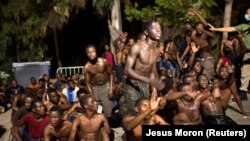On June 27, Spain’s Prime Minister Pedro Sanchez expressed gratitude to Morocco’s government for its handling of an attempt by African asylum-seekers to cross en masse into the Spanish enclave of Melilla.
Sanchez told the Spanish news outlet La Vanguardia he regretted the casualties that occurred on June 24, when some 2,000 migrants tried to rush into the enclave from Morocco’s Nador city.
The Moroccan police responded with force. News reports and rights groups as many as 37 people died and dozens were injured in one of the worst such incidents at Melilla in years.
The Spanish enclaves of Ceuta and Melilla on Morocco’s Mediterranean coast are the only sections of European land in Africa. Both cities have been under Spanish control for 400 years. When Morocco gained independence from France and Spain in 1956, Spain retained the cities.
Moroccan authorities initially said the migrants died in a stampede or as a result of falling from the high, barbed-wire fence that separates Melilla from Moroccan territory.
Defending Morocco, Sanchez said the country had been “suffering from the violent actions of migrants.”
“Those most responsible for the tragedy that occurred, and the unfortunate loss of human lives are the international mafias that organize the violent attacks.”
That is misleading.
On June 27, Omar Naji, an activist with the Moroccan Human Rights Association (AMDH), was one of the few witnesses at the scene. He said in an interview posted on ENASS, an independent Moroccan digital media outlet, that police turned to violence to stop the migrants.
Naji said the migrants, from Sudan and elsewhere in sub-Saharan Africa, were thrown to the ground, with many injured and left without medical treatment for hours.
The AMDH branch in the city of Nador, which is adjacent to Melilla, posted videos and photos on its Twitter account showing migrants on the ground being beaten and handcuffed.
On June 27, EuroMed Rights, a network of 80 human rights organizations in Europe and the Mediterranean region, released a statement signed by 45 Moroccan and European human rights groups demanding an investigation.
The statement said such an event was predictable, given the history of mass arrests, searches of refugee camps and forced transfers of refugees to southern Morocco.
EuroMed said that for years, refugees had been subjected to systematic violence by Spanish and Moroccan security forces, depriving them of basic rights.
“In the past one and half-years, refugees in Nador have been deprived of medication and health care. Their camps are burned and their possessions are taken, and the scarce food they have was destroyed, while whatever drinking water they have was confiscated,” the statement said.
Activists accused Morocco of trying to cover up the Melilla violence by burying the dead without investigation or autopsy, Britain's The Guardian newspaper reported.
Judith Sunderland, an associate director of Human Rights Watch (HRW) in New York City, said the Moroccan government should “spare no effort” to identify the bodies, preserve them in a dignified manner and allow autopsies to determine the cause of death.
“These were horrifying deaths. The scenes from Melilla are downright dystopian, exemplifying everything that is unconscionable about Spain and the EU’s approach to migrants and refugees, particularly if they are black or brown,” Sunderland said.
In a joint statement, the U.N. refugee agency (UNHCR) and the International Organization for Migration (IOM) deplored the loss of lives on the Nandor-Melilla border, urging “all authorities to prioritize the safety of migrants and refugees, refrain from the excessive use of force and uphold their human rights.”
Morocco has a long history as a waypoint for emigration to Europe and elsewhere, particularly for migrants from West Africa. According to the UNHCR, Morocco is both a transit and host country, with more than 19,000 asylum seekers there registered with the U.N. agency, of which 5,150 are Syrians and the rest from Yemen and African countries.
In April, Morocco and Spain reached a cooperation agreement to mend strained relations, mainly over the territory of Western Sahara, a former Spanish colony that Morocco annexed. The Sahrawi people formed the Polisario Front and launched a guerrilla war for independence from Morocco. In 1991, the U.N. brokered a ceasefire between Morocco and Polisario.
Relations between the two deteriorated in 2021, however, when Spain allowed Polisario Front leader Brahim Ghali to receive health treatment without informing the Morrocan government.
In response, Morocco turned a blind eye to 8,000 migrants, including 1,500 minors, who entered Spanish Ceuta over two days. Spain deployed military reinforcements to the enclave and said it sent half of the migrants back.
The April agreement reinforced joint security cooperation to curtail Europe-bound migration.
In May 2021, Amnesty International denounced Spanish police abuses of migrants on the border of Ceuta and mass returns of migrants without safeguards. The London-based human rights group accused Morocco and Spain of using migrants as “pawns in a political game.”
“European leaders were quick to support Spain and say that Spanish borders are EU borders. By the same logic, Spanish abuses are also EU abuses,” said Virginia Alvarez, head of internal policy at Amnesty International Spain.
Morocco’s General Directorate for National Security said last year it had dismantled 150 criminal networks organizing irregular migration, arrested 12,231 would-be migrants and 415 suspects for organizing irregular migration attempts.
Moroccan government spokesman Mustafa Baitas denounced smuggling networks for selling people illusions and driving them into situations with grave consequences.
Baitas said these networks are seeking to damage Morocco’s image and its "humanitarian" approach to the migration issue.





